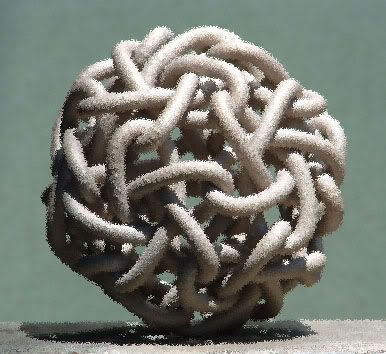 While wintering his army at Gordium in 333 BC, Alexander the Great attempted to untie the Gordian Knot. Myths had circulated that whomever should untie the knot would swiftly rise to become the most powerful ruler of Asia. When Alexander could find no end to the knot, by which to unbind it, he sliced it in half with a stroke of his sword, producing the required ends (the so-called “Alexandrian solution”).
While wintering his army at Gordium in 333 BC, Alexander the Great attempted to untie the Gordian Knot. Myths had circulated that whomever should untie the knot would swiftly rise to become the most powerful ruler of Asia. When Alexander could find no end to the knot, by which to unbind it, he sliced it in half with a stroke of his sword, producing the required ends (the so-called “Alexandrian solution”).
Like the mythical Gordian Knot of ancient times, the latest photo contest on Lenzr hopes to collect a whole lot of knots and twisted connections.
The photo contest Everyday Tangled Web is displaying some modern Gordian Knots and asking viewers to appraise a technological advanced collection of chaotic cables and cords. As relief from the puzzle, the prize in this crafty contest is a wireless headset that has been donated by an office phone system consultant, installer and contest sponsor – these guys use technology to help engineer a clutter free workspace. So the modern translation of the Alexandrian Solution is a bluetooth wireless headset.
Are there Ley Lines in Muskoka?
The idea of Ley Lines was first introduced in England when it was noticed that many sites and villages and other places of interest whose names all ended in ley were to be found along the same straight lines.
Literally hundreds of separate line systems have been uncovered and prove there was nothing accidental about the way ancient peoples sited their monuments which were often in astonishing harmony to one another, even over distances of hundreds of miles.
In Muskoka, the land is much younger, and much rougher. There are over 1,600 beautiful lakes in this regiona and that make travel in straight lines very difficult. However animals and native peoples have made the rudiments of very straight paths. The ‘indian trails’ of the Algonquin and Huron tribes follow these energy paths through the woods, over rocks and streams. Early explorers to the region like Samuel De Champlain came to the area followed by Missionaries and the hundreds of years later the first roads were built – these highways ignored the energy paths and made conduits for wheeled transportation cheapest and easiest. The name Muskoka is thought to come from the name of a Chippawa tribe chief named Mesqua Ukee which means “not easily turned back in the day of battle”. He would have been more comfortable on the energy pathes or ley lines , than the roads.
Leave a Reply